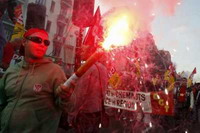Nicolas Sarkozy under pressure of striking rail workers
Rail workers will go on with their strike for a seventh day through Tuesday, increasing pressure on President Nicolas Sarkozy to give the idea to reform France.

But the government stood its ground, with Prime Minister Francois Fillon saying the reforms must go through - even though the strikes are costing the government at least 300 million EUR(US$439.6 million) a day.
Strikes led by train drivers angry over Sarkozy's plans to extend their retirement age have hampered rail traffic and public transport and snarled roads for nearly a week. Schools, postal and tax services will fall victim to a strike Tuesday by civil servants seeking higher salaries and job security. Air traffic, too, will be affected.
Simmering student protests that have disrupted classes at dozens of universities added yet another dimension to the angry fallout from Sarkozy's efforts to jolt France into a new, more competitive era.
There were no immediate signs that the various movements planned to fuse their efforts - simultaneous but separate - into a single blanket protest, despite words of solidarity among them.
The conservative president, who has often jumped into trouble spots to fix them himself, has remained curiously silent about the strike.
Sarkozy was elected in May on promises to reform France - from its courts to its creaking university system, its army of civil servants to rail workers whose special retirement privileges he vowed to erase.
Taking on the transport workers has proved to be an especially thorny - and costly - task as unions voted Monday to extend their open-ended strike for a seventh day.
"It's a real worry for the French economy," Finance Minister Christine Lagarde said. The strikes are costing the French economy between 300 million EUR and 350 million EUR(US$439.6 million and US$512.7 million) a day, she said.
Talks between unions and the management of the rail network and Paris transit authority were set for Wednesday.
Authorities have backed off slightly from the original government position of no talks during strikes. Fillon said Monday that rail traffic must "progressively restart" before the talks can begin.
The government "has a mandate to push this reform forward," Fillon said. He added that "lots of subjects" are nevertheless open to discussion.
He dismissed as a minority the protesters hobbling the Paris subway and nationwide rail system.
Meanwhile, civil servants seeking pay hikes prepared for what was expected to be a massive walkout Tuesday.
Air traffic controllers fall under the civil servants' category, meaning disruptions could be expected. Air France employees have said they will take part in the job action, and the company said flights, mainly domestic, would be modified from Marseille and Paris' Orly airport.
Students were also joining Tuesday's protest. Knots of students have been blocking universities around France for two weeks to protest a law passed this summer allowing universities more autonomy to seek nongovernment income. They fear the changes mean schools will close their doors to the poor.
In a clear bid to appease, the minister in charge of civil servants' affairs, Eric Woerth, said he hoped to conclude a new salary agreement soon - the first in 10 years.
However, the head of the FSU union warned the government not to dismiss the strikers.
"They seem to believe this is just a movement of anger that will pass," Gerard Aschieri said, adding that "this is to underestimate the discontent."
Subscribe to Pravda.Ru Telegram channel, Facebook, RSS!


